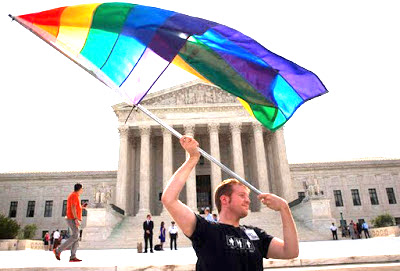US cities take the lead in protecting LGBTQ residents
WASHINGTON, DC — Cities across the country, including in California, continue to take the lead in supporting LGBTQ people and workers even in face of renewed attacks this year on the LGBTQ community by federal and state officials, according to a new report.
The Human Rights Campaign (HRC) Foundation, the educational arm of the nation’s largest lesbian, gay, bisexual, transgender and queer (LGBTQ) civil rights organization, released its sixth annual Municipal Equality Index (MEI), assessing LGBTQ equality in 506 cities across the nation, including 57 in California.
The 2017 Municipal Equality Index is the only nationwide rating system of LGBTQ inclusion in municipal law and policy. HRC produced it in partnership with the Equality Federation Institute.
For LGBTQ Americans, legal protections and benefits vary widely depending on location; states and cities have markedly different laws governing discrimination.
Twenty states have non-discrimination laws that include protections for LGBTQ people in employment, and 19 states have laws that protect LGBTQ people from discrimination in places of public accommodation.
But cities are leading the way: since the MEI’s debut in 2012, the number of cities earning perfect scores has increased more than six-fold, and today at least 24 million people live in cities that have more comprehensive, transgender-inclusive non-discrimination laws than their state.
The average score for cities in California is 76 out of 100 points, which falls above the national average of 57.
| Anaheim | 80 |
| Bakersfield | 60 |
| Berkeley | 95 |
| Brisbane | 54 |
| Cathedral City | 100 |
| Chula Vista | 86 |
| Concord | 67 |
| Corona | 60 |
| Elk Grove | 77 |
| Escondido | 60 |
| Fontana | 60 |
| Fremont | 86 |
| Fresno | 57 |
| Fullerton | 76 |
| Garden Grove | 61 |
| Glendale | 65 |
| Hayward | 67 |
| Huntington Beach | 61 |
| Irvine | 83 |
| Lancaster | 78 |
| Long Beach | 100 |
| Los Angeles | 100 |
| Modesto | 59 |
| Moreno Valley | 60 |
| Oakland | 84 |
| Oceanside | 100 |
| Ontario | 54 |
| Orange | 71 |
| Oxnard | 53 |
| Palm Desert | 72 |
| Palm Springs | 100 |
| Palmdale | 71 |
| Pasadena | 84 |
| Pomona | 72 |
| Rancho Cucamonga | 54 |
| Rancho Mirage | 100 |
| Riverside | 65 |
| Sacramento | 100 |
| Salinas | 55 |
| San Bernardino | 61 |
| San Diego | 100 |
| San Francisco | 100 |
| San Jose | 100 |
| Santa Ana | 63 |
| Santa Clarita | 65 |
| Santa Monica | 78 |
| Santa Rosa | 87 |
| Signal Hill | 97 |
| Stockton | 70 |
| Sunnyvale | 73 |
| Thousand Oaks | 61 |
| Torrance | 66 |
| Vallejo | 81 |
| Visalia | 62 |
| West Hollywood | 100 |
| Guerneville | 100 |
| Richmond | 84 |
Progress on transgender equality has been particularly noteworthy in cities across America this year, continuing a positive trend that the MEI has tracked — and encouraged — since 2012.
Transgender-inclusive health care benefits are offered to employees of 111 municipalities this year — up from 86 in 2016, 66 in 2015 and just five in 2012. The MEI’s Issue Brief on Transgender-Inclusive Health Benefits is available here.
Other key findings from the 2017 Municipal Equality Index include:
- 86 cities from states without comprehensive nondiscrimination laws protecting LGBTQ people scored above the overall nationwide average of 57 points. These cities averaged 84-point scores; 28 scored a perfect 100.
- Cities continue to excel even in the absence of inclusive state laws: 41“All Star” cities in states lacking comprehensive non-discrimination laws scored above 85 points, up from 37 last year, 31 in 2016, 15 in 2014, eight in 2013, and just two in 2012.
- The national city score average increased from 55 to 57 points. 68 cities scored 100 points; 25 percent scored over 79 points; 50 percent scored over 59 points; 25 percent scored less than 36; and 11 cities scored zero points.
The MEI rated 506 cities including the 50 state capitals, the 200 largest cities in the United States, the five largest cities or municipalities in each state, the cities home to the state’s two largest public universities, municipalities that have high proportions of same-sex couples and 98 cities selected by HRC and Equality Federation state group members and supporters.
It assesses each city on 44 criteria covering citywide nondiscrimination protections, policies for municipal employees, city services, law enforcement, and city leadership’s relationship with the LGBTQ community. Starting in 2018, the MEI will introduce new criteria including protecting youth from “conversion therapy” and will deduct points for religious exemptions that allow discrimination by singling out LGBTQ people.
The full report, including detailed scorecards for every city, as well as a searchable database, is available online at www.hrc.org/mei.


